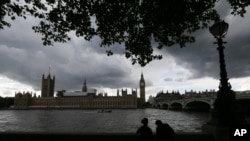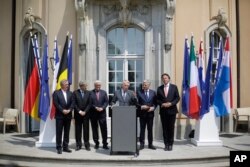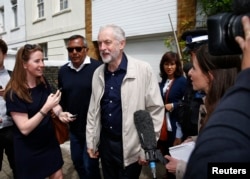Is Britain really going to break from the European Union?
On a day of fast-moving events that plunged the increasingly divided country deeper into the worst national crisis it has faced World War II, German Chancellor Angela Merkel said British politicians should be given time to re-consider the consequences of Brexit.
Kerry in Europe
Merkel's conciliatory remark came as U.S. Secretary of State John Kerry arrived in Europe, first stopping in Rome before heading for emergency meetings this week in London and Brussels. U.S. officials say he’s seeking to act as a mediator and that Washington has been advising EU leaders not to press the British government to invoke Article 50, which would set Britain on an automatic two-year path to Brexit.
“We are monitoring and involved in conversations that are going on between the British and their counterparts in Europe and trying to help with those communications,” a senior U.S. government official told VOA.
In her remarks Sunday, made via her chief of staff, Chancellor Merkel said that Britain “should have the possibility to reconsider the consequences of exit.” Her aide, Peter Altmaier, added, though, that did not mean, “reconsidering Brexit itself.”
On Saturday, the German Chancellor also sounded an appeasing note by urging her fellow EU leaders to react cautiously to Britain’s Brexit referendum, breaking sharply with European foreign ministers who on the same day called for a quick divorce. The foreign ministers argue uncertainty will continue to roil financial and currency markets.
Secretary Kerry sought to reassure Britain and the European Union of continued American support, during a news conference Sunday in Rome. He said while Washington regretted the Brexit referendum result, “the changes that now are being thought through have to be thought through in the context of the interests and the values that bind us together.”
Noticeably, while acknowledging Britain had made a decision, Kerry appeared to stop short of indicating it was irreversible. He said, “In a democracy, when the voters speak, it is the job of leaders to listen and then to make sure that they are moving in a way that that is responsible to address the concerns.”
With Britain in uproar and, in the words of Labor lawmaker Emily Thornberry, “turned upside down and inside out and with no sense of where we are going,” pro-EU lawmakers in all parties are seeking ways to delay Brexit.
They are exploring their best options on how best to avert it altogether or at least to secure an association deal with the EU similar to Norway’s and Switzerland’s.
Scotland's case
Scotland’s First Minister Nicola Sturgeon, the most pro-active politician north or south of the border, threw a political bomb Sunday as far as Leave campaigners are concerned by insisting that the Scottish Parliament had the power to veto Brexit by withholding its consent.
Scotland voted overwhelmingly in Thursday’s referendum to stay in the European Union. Sturgeon has already warned she will explore every option to keep Scotland in the bloc, including seeking a possible second independence plebiscite.
She told the BBC’s Sunday Politics show, “The issue you are talking about is would there have to be a legislative consent motion or motions for the legislation that extricates the UK from the European Union? “Looking at it from a logical perspective, I find it hard to believe that there wouldn’t be that requirement. I suspect the UK Government will take a very different view on that, and we’ll have to see where that discussion ends up.”
Asked by the presenter, “Can you imagine the fury of the British people if you stopped them leaving Europe?” Scotland’s First Minister replied, “I can, but it’s perhaps similar to the fury of many of the people in Scotland right now as we face the prospect of being taken out of the European Union against our will.”
Legal experts are divided on whether the Scottish parliament’s consent would be required legally for a Brexit. Politically, though, it could prove very hard to ignore the Scottish parliament. Sidestepping the legislature north of the border would almost certainly fuel Scottish nationalist sentiment and make Scotland’s break with the British union inevitable.
Labour Party politics
In other developments Sunday, open rebellion broke out in the country’s opposition Labour Party with senior lawmakers resigning their “shadow cabinet” positions in a bid to force Jeremy Corbyn to relinquish the leadership and to make way for a more effective replacement.
They argue the leftwing Corbyn shares the blame for the Brexit referendum result, accusing him of only half-heartedly campaigning on behalf of remaining in the European Union.
Centrists in the parliamentary Labor Party suspect the crisis the country is gripped in will force the Conservative government, which only has an eight-seat majority in the House of Commons, to call an early general election within months. They say that with a strong leader campaigning to Remain, Labour could win.
While pro-EU politicians were involved behind-the-scenes searching out ways of averting a break with the European Union, Leave campaigners, including the normally talkative Boris Johnson and Nigel Farage, were quiet.
Like Labor, the ruling Conservative Party has also been thrust into a toxic leadership battle in the wake of the Brexit referendum. Prime Minister David Cameron’s decision to make way for a replacement – a decision some analysts suspect was made to delay invoking Article 50 – is adding to recriminations about the Brexit referendum. The Sunday Times reported that a “Stop Boris” movement is building among pro-EU Conservative lawmakers who are determined to block Johnson from succeeding Cameron, fearing he will worsen Britain’s relations with the EU.
A petition for re-running the referendum has gained more than three million signatures, almost guaranteeing a parliamentary debate that will likely compound the fractures within both the Labour and Conservative parties over Brexit.








